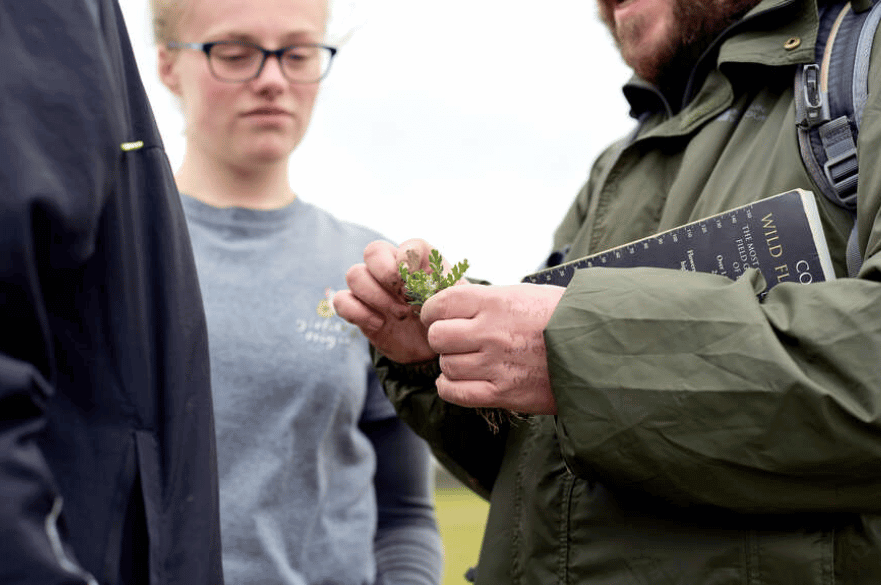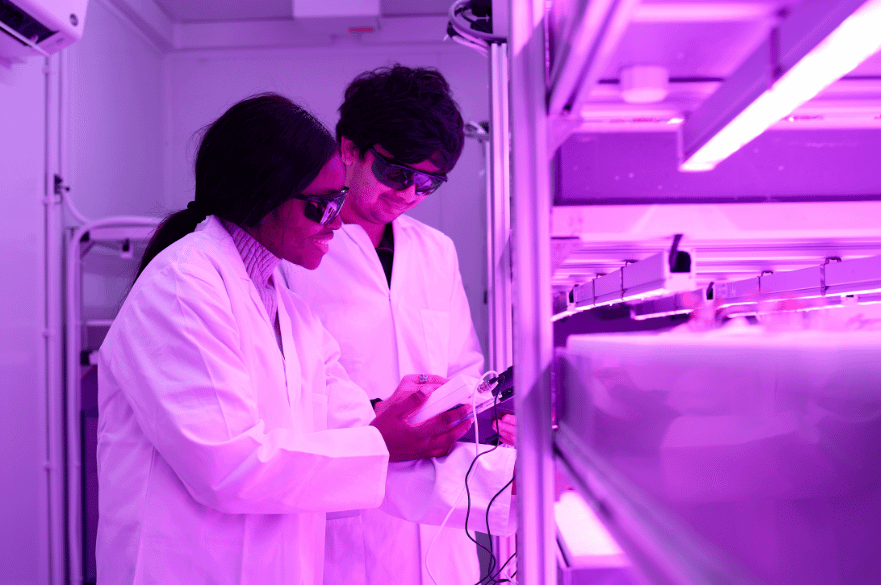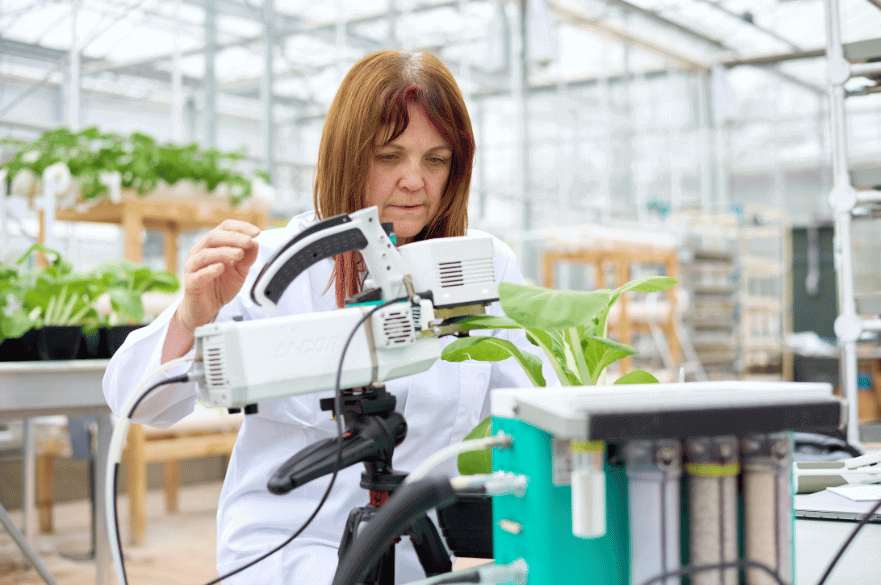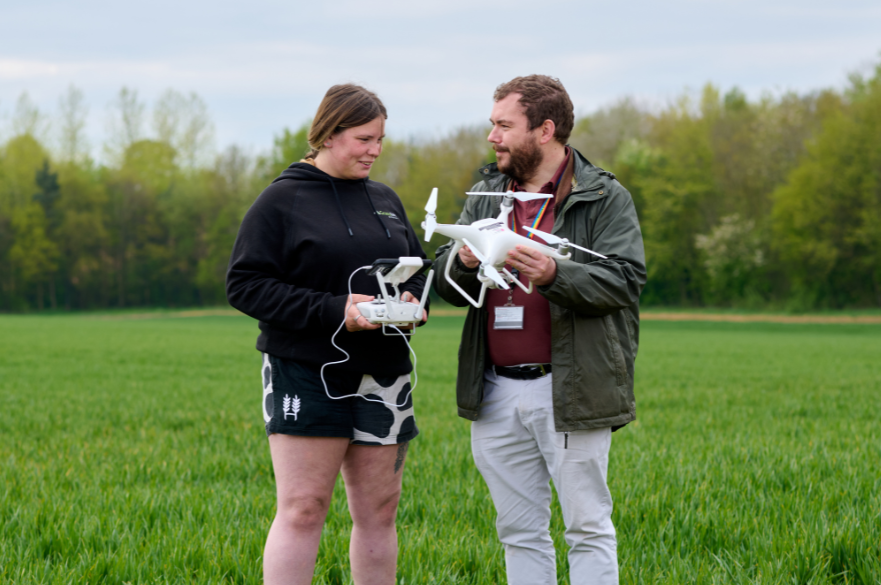This course is in Clearing
Offers from 56 tariff points
About this course
This course is an integrated foundation degree, where you'll progress onto our BSc (Hons) Agriculture course, once you successfully complete your foundation year.
Our integrated foundation degrees offer a unique gateway to our BSc courses for those who currently don't meet the degree-level entry criteria. The foundation year acts as a launch pad, supporting you with the transition to university learning. Anticipate a year filled with the development of robust study skills, increased confidence in tackling intricate problems, and the cultivation of independent learning. Rest assured, by the end of this transformative year, you'll emerge well-prepared for the exhilarating challenges that await you at degree level.
About the BSc course
Feeding an increasing population against a backdrop of different weather patterns induced by climate change presents a major challenge to the farming industry’s future. This course focuses on innovative approaches to agriculture, providing you with the skills and knowledge needed to apply sustainable agriculture practices and play a part in global food security. Designed in consultation with the National Trust – one of the largest landowners in the UK – it gives you the opportunity to study on the University’s 200-hectare farm and rural estate, based at our Brackenhurst Campus.
15
What you’ll study
Our world is changing. Feeding an increasing population against a backdrop of different weather patterns induced by climate change presents a future challenge to the farming industry. We must adopt innovative and sustainable approaches whilst providing effective environmental stewardship. This course offers the opportunity to study at the University's 200-hectare farm and rural estate based at our Brackenhurst Campus. Here you'll develop and devise new techniques and technologies to enhance sustainable agricultural production.
You'll also have the opportunity to learn from visits and placements with a range of partner organisations. These will give you a broad knowledge of where the sector is and where it needs to go in the future.
This is your foundation year. You'll study five modules and there's a detailed breakdown of what's included in each below.
Foundation Biology (20 credits)
Study fundamental biological concepts across various areas. You'll explore topics including the characteristics of living organisms, classification and taxonomy, cell structure, microbiology, genetics, and biological systems.
Laboratory Skills (20 credits)
Gain essential laboratory skills for biological and environmental sciences. Emphasizing good laboratory practice, health and safety, and key techniques like weighing, dilution, titration, and microscopy, you'll develop proficiency in recording, evaluating, and presenting laboratory findings.
Science in Practice (20 credits)
Learn cross-disciplinary scientific application skills. Utilizing case studies, you'll explore how scientific principles address real-world problems in various sectors. Topics encompass sustainability, including the identification of the 17 Sustainable Development Goals (SDGs), data presentation and interpretation, and positive actions to mitigate human impact on ecosystems.
Field Skills (20 credits)
Gain technical and practical field skills. Through practical classes on the campus estate and at other locations, you'll explore fieldwork safety and risk assessment, as well as key techniques like map reading, plant and animal identification, and environmental analysis. Additionally, you'll also look at data collection in the field and report writing for fieldwork.
Preparing for Success (40 credits)
Explore your personal values and look at the human, social and emotional aspects of professional learning to support your transition to studying at degree-level. Via problem-based and experiential learning, you'll explore note-taking, Virtual Learning Environment usage, time management, assessment interpretation, exam techniques, professional communication, scientific write-ups, citation and referencing, and presentation skills.
From Year Two onwards, you'll study the modules of the degree course.
Livestock Production Systems (20 credits)
Study the principles of the main livestock systems and how these differ with scale, climate and economic conditions.
Crop Production Systems (20 credits)
Study the main crop production systems, including cultivation practices, both in the UK and across the globe.
Plants and Soil Science (20 credits)
Develop an understanding of the anatomy and physiology of plants and how they function in relation to their environment. Learn the principles of soil science, and how soils are managed for optimal plant growth.
Animal Structure, Function and Adaptation (20 credits)
Explore animal anatomy and physiology across a range of species. You'll delve into cellular biology, genetic processes, survival strategies and how animals adapt to environmental challenges in various ecosystems.
Introduction to the Agricultural Industry (20 credits)
This module provides an overview of the social and economic environment in which the industry operates. You’ll learn about farm business structures, farm management and accounts. You’ll also get an introduction to farm management software.
Agricultural Operations (20 credits)
Gain practical experience in various on-farm operations, including machinery, pesticide application, telehandler use, basic livestock practices, fencing, and boundary maintenance. You'll also develop regulatory and health and safety knowledge.
Contemporary Issues in Agriculture (20 credits)
Study the current economic and political climate in which the agriculture industry operates. Issues explored include the sustainability of food supply chains and food security.
Introduction to Research (20 credits)
Explore the principles of research methods in biological sciences, focusing on data collection, analysis, and interpretation. You'll look at experimental design, literature evaluation and hypothesis testing, preparing you for undertaking independent research as part of your final year dissertation.
Livestock Nutrition and Health (20 credits)
Learn about feedstuffs and gain an insight into animal nutrition. This module will also cover pathogens, animal health, and antibiotic resistance.
Land Use Ecology (20 credits)
Explore land uses such as farming and forestry, whose productivity is determined by the presence and products of ecological processes, and the impacts of humans upon them.
You'll also choose two optional modules. Examples include one from:
Crop Nutrition, Health and Protection (20 credits)
Gain a sound understanding of the macro and micronutrients required by crops, and the fertilizers used to support crop growth. You’ll also learn about the pests and diseases most often affecting crops, and how these can be controlled.
Applied Animal Breeding (20 credits)
Gain knowledge of genetics, reproductive behaviour, applied breeding management and reproduction technologies within domestic and production animal species.
And another one from:
Farm Business Performance (20 credits)
Learn to analyse and utilise data and use an evidence-based approach to solve problems and inform decision-making to optimise business performance with the assistance of farm computing and software systems.
Geographical Information Systems (GIS) and Spatial Analysis (20 credits)
Study the mapping and analytical techniques used in geographical information systems (GIS). Explore the applications of technology across a wide range of topic areas.
This is a placement year for students on the sandwich course.
Dissertation (40 credits)
Undertake independent research under supervision. Focus on your own area of interest within agriculture.
Advances in Livestock and Crop Production (20 credits)
Examine advances in agriculture with specific focus on current research and emerging practices and technologies.
Sustainable Management of the Agricultural Environment (20 credits)
Investigate agricultural resources and environments and find solutions to global challenges such as soil degradation.
You'll also choose two optional modules. Examples include:
Global Agriculture and Food Security (20 credits)
Gain an insight into the global agricultural industry and investigate the concepts of production in agriculture, forestry and fisheries. You’ll learn about the current agricultural practice and policy in the UK and EU, investigate current scientific advances, explore issues relating to harvesting and production of food from sustainable sources, and consider global food security.
Energy for a Low Carbon Future (20 credits)
Investigate how to harness and distribute safe, clean energy from sources that do not deplete with use. Consider the depletion of fossil fuels and the increasing demand for energy and evaluate the choices available for the future.
Application of Remote Sensing (20 credits)
You’ll learn how to process, analyse and interpret information from a range of existing remote sensing techniques. You'll also obtain information for mapping and spatial analysis using data from both historical and the very latest high resolution sensors.
Business Management (20 credits)
Develop your understanding of farm business management and learn to create innovative business plans, considering a multitude of aspects, from finance to marketing and resource management, which could be used to seek finance of a business, apply for a tenancy or partnership, or assist with the management of an existing business or start-up.
Ecosystem Ecology (20 credits)
Examine the ecology of landscapes and ecosystems. Understand the influence of, and relationship between, location and ecological processes, and the resulting ecosystem goods and services that come from them.
We regularly review and update our course content based on student and employer feedback, ensuring that all of our courses remain current and relevant. This may result in changes to module content or module availability in future years.
Don’t just take our word for it, hear from our students themselves
Student Work
Video Gallery
How you're taught
You will be taught through a variety of methods including group seminars, lectures and practical sessions.
There is a diverse range of assessment methods, including exams, dissertations, group and individual projects, posters, scientific reports, and farm business plans.
A placement year may be taken between year 3 and year 4 of study.
Please note that field trip locations may vary and are subject to availability and change.
Careers and employability
Your future career
This course has been designed to allow you to enter this exciting industry in a range of roles. You'll be able to use your expertise to either work in farming at a managerial level, or in the allied industries in roles such as a farm advisor or crop protection specialist. There will also be opportunities for careers for those specialising in sustainable production, environmental protection and agricultural conservation.
Placement opportunities
You'll have the opportunity to take a placement year or a shorter summer placement. Typical work experience takes place on farms, in agricultural research stations and in allied industries such as seed merchants, agricultural consultancies and advisory services.
NTU Enterprise
You'll also have the opportunity to turn your ideas into a viable business with help from NTU Enterprise, NTU's purpose-built Centre for Entrepreneurship and Enterprise, a support centre to help students create, develop and grow their own businesses.
Campus and facilities
As a dedicated home for our animal, rural and environmental science courses, the Brackenhurst Campus has a character all of its own. From the population of almost 2,000 students and staff to the animals themselves — cats and cattle, sheep and horses — it’s all about community. Relax with a coffee in the Orangery; kick back with your coursemates in the Brack Bar; enjoy the peace and quiet of our Victorian walled garden or Eco-Library; grab a pal and wander through 500 acres of stunning countryside.
You'll have access to a countryside estate that includes a working farm, a herd of award-winning Lincolnshire Red cattle and a flock of sheep, a wide range of arable crops, and industry-standard agricultural facilities and machinery. You'll also have access to a dedicated suite of glasshouses and polytunnels. It's the perfect outdoor classroom, enabling you to put theory into practice from day one.
Our Brackenhurst Campus sits on the doorstep of Southwell: a picture-perfect market town filled with rustic pubs, cosy cafés, and boutique shops. A little further afield, and served by reliable buses that run late into the night, you’ve got Nottingham — one of Britain’s top 10 student cities, and one of Europe’s top 25. It’s stuffed with history, culture, and well-kept secrets to discover at your leisure: enjoy lush green spaces, galleries, hidden cinemas and vintage shopping by day, and an acclaimed food, drink and social scene by night.
Entry requirements
This course is in Clearing
Looking for a place in Clearing? We are accepting application and would love to hear from you!
UK students
This course is in Clearing
Looking for a place in Clearing? We are accepting applications and would love to hear from you!
Clearing requirements
From 56 UCAS tariff points from up to 3 qualifications.
To discuss our entry requirements and see what we can offer you, call us now on +44 (0)115 848 6000. Alternatively, if you already have your qualifications, apply online via our Clearing Application form.
Preparing for results day? Beat the queue and sign up for NTU Priority for up-to-date information about all things Clearing. You’ll get an offer ahead of Clearing, subject to you achieving the required grades on results day.
Additional requirements:
- GCSE English, Maths and Science grade C / 4, or equivalent.
To find out what qualifications have tariff points, please use our tariff calculator.
Additional requirements for UK students
Access to Higher Education courses
If you’re aged 19+ and don’t have the qualifications to meet the entry criteria, you can study an Access to HE course right here at NTU. These one-year courses are designed specifically as an alternative route to university.
Contextual offers
If you don’t quite meet our entry requirements, we might be able to make you a lower offer based on a range of factors, including your background (such as where you live and the school or college you attended), your experiences and your individual circumstances (you may have been in care, for example). This is called a contextual offer, and we get data from UCAS to help make these decisions. We do this because we believe everyone with the potential to succeed at NTU should have the opportunity to do so, no matter what barriers you may face.
Meeting our entry requirements
Hundreds of qualifications in the UK have UCAS Tariff points attached to specific grades, including A-levels, BTECs, T Levels and many more. You can use your grades and points from up to three different qualifications to meet our criteria. Enter your predicted or achieved grades into our Tariff calculator to find out how many points your qualifications are worth.
Other qualifications and experience
NTU welcomes applications from students with non-standard qualifications and learning backgrounds, either for year one entry or for advanced standing beyond the start of a course into year 2 or beyond.
We consider study and/or credit achieved from a similar course at another institution (otherwise known as credit transfer), vocational and professional qualifications, and broader work or life experience.
Our Recognition of Prior Learning and Credit Transfer Policy outlines the process and options available for this route. If you wish to apply via Recognition of Prior Learning, please contact the central Admissions and Enquiries Team who will be able to support you through the process.
Getting in touch
If you need more help or information, get in touch through our enquiry form.
International students
This course is in Clearing
Looking for a place in Clearing? We are accepting applications and would love to hear from you!
Clearing requirements
From 56 UCAS tariff points from up to 3 qualifications.
To discuss our entry requirements and see what we can offer you, call us now on +44 (0)115 848 6000. Alternatively, if you already have your qualifications, apply online via our Clearing Application form.
Preparing for results day? Beat the queue and sign up for NTU Priority for up-to-date information about all things Clearing. You’ll get an offer ahead of Clearing, subject to you achieving the required grades on results day.
Additional requirements:
- GCSE English, Maths and Science grade C / 4, or equivalent.
Additional requirements for international students
There are no additional requirements for this course.
English language requirements
View our English language requirements for all courses, including alternative English language tests and country qualifications accepted by the University.
If you need help achieving the language requirements, we offer a Pre-Sessional English for Academic Purposes course on our City campus which is an intensive preparation course for academic study at NTU.
Other qualifications and experience
If you have the right level of qualifications, you may be able to start your Bachelors degree at NTU in year 2 or year 3. This is called ‘advanced standing’ entry and is decided on a case-by case basis after our assessment of your qualifications and experience.
You can view our Recognition of Prior Learning and Credit Transfer Policy which outlines the process and options available, such as recognising experiential learning and credit transfer.
Sign up for emails
Sign up to receive regular emails from the International Office. You'll hear about our news, scholarships and any upcoming events in your country with our expert regional teams.
Getting in touch
If you need advice about studying at NTU as an international student or how to apply, our international webpages are a great place to start. If you have any questions about your study options, your international qualifications, experience, grades or other results, please get in touch through our enquiry form. Our international teams are highly experienced in answering queries from students all over the world.
Policies
We strive to make our admissions procedures as fair and clear as possible. To find out more about how we make offers, visit our admissions policies page.










